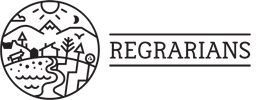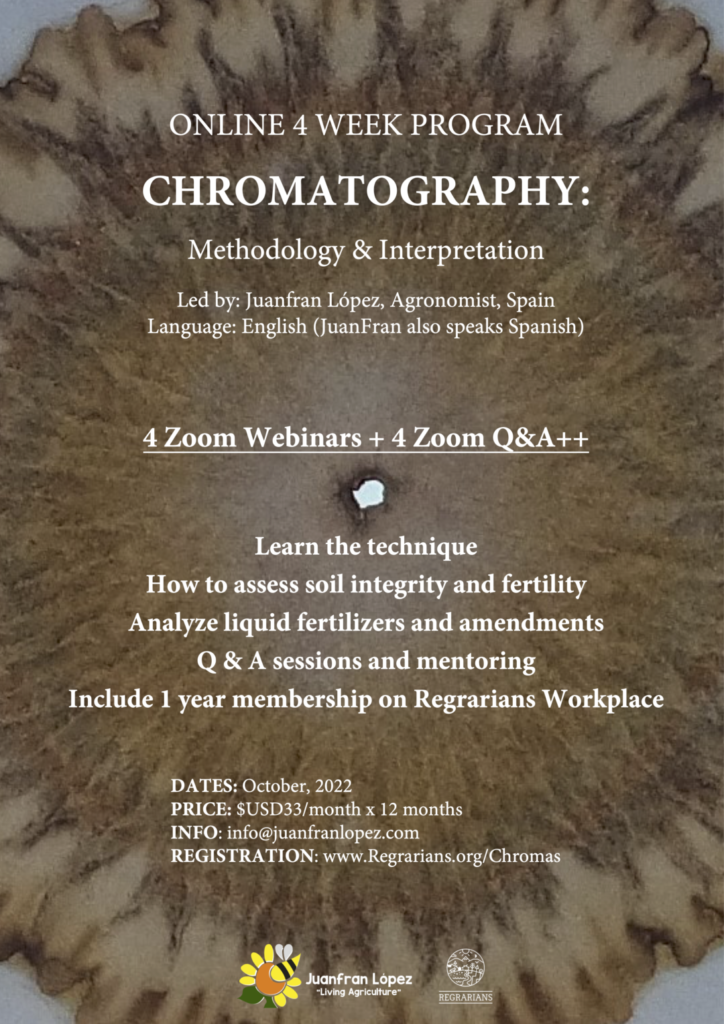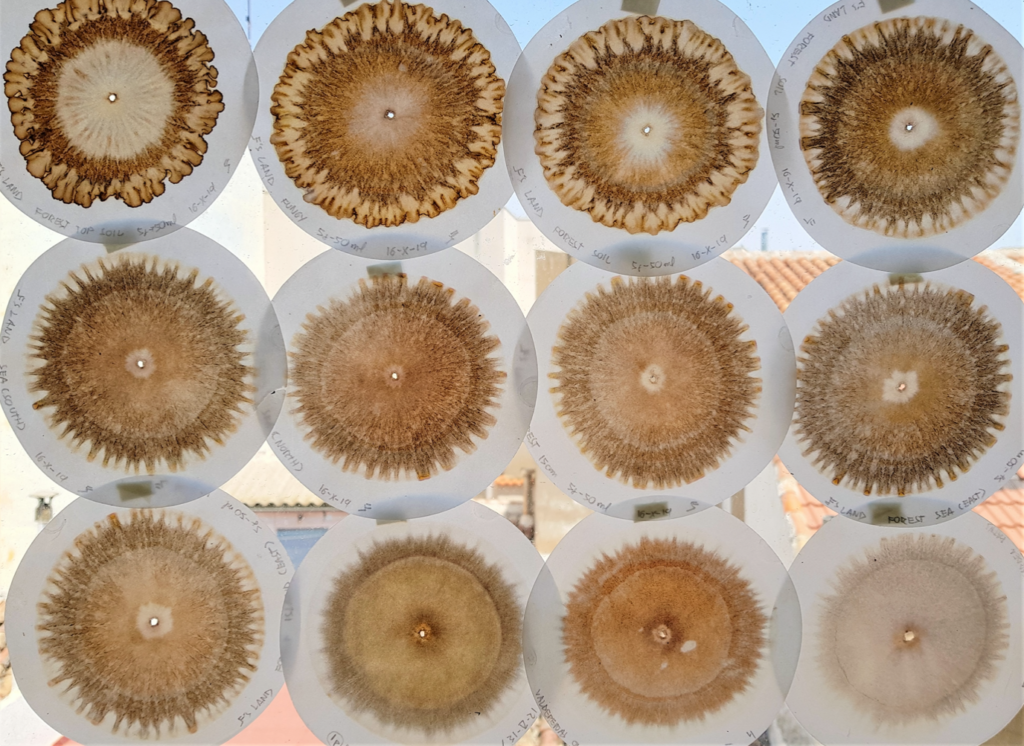Regrarians are proud to work with our partner and friend, Spanish agronomist JuanFran Lopez in offering this world-first online Chromatography program.
JuanFran is widely recognised as being the world’s leading English-speaking figure in the practical application of chromatography and biofertilisers, having studied extensively with Jairo Restrepo Rivera and though his book ‘The Biofertiliser Manual‘.
WHAT IS CHROMATOGRAPHY?
CHROMATOGRAPHIC ANALYSIS (from the Greek, chroma colour, and graphein, to write) is a technique used to qualitatively view on paper a ‘Chromatogram’ that depicts the capillary patterns of the separation of various ingredients in a fluid mixture. Typically chromatograms create a ‘picture’ of the relationships between the inorganic and organic chemistry of soil, compost, plant and food samples.
Chromatography was developed by Russian-Italian botanist Mikhail Tsvet in 1900. In the 1930’s a famed student of Rudolf Steiner, Lili Kolisko, developed ‘Capillary Dynamolysis’ as a means of assessing food quality from an anthroposophic perspective. The work of Archer Martin and Richard Synge in developing ‘partition chromatography’ won them the 1952 Nobel Prize in Chemistry. It was the work (also in the 1950’s) of biodynamic agriculture pioneer Ehrenfried Pfeiffer in his development of ‘Round Filter Chromatography’ that is being practically demonstrated in this course by JuanFran.
It is a selective and low-cost physical method to separate compounds in solution that is used in many
different fields of science and in the case of soils, this technique is focused to assess the
quality and then the fertility. If you have done a pregnancy test or a rapid antigen test (RAT) for COVID-19 then you have used chromatography.
HOW DO WE USE IT?
In the case of soil analyses, the result is a ‘photo’ which gives us useful information about
the integration between physical, chemical and biological features, which are easy to
understand and replicate by farmers.
The info gathered is linked with the health of the soil as we can observe its structure,
the minerals available for the plant, biological diversity, organic matter content, and humus.
In order to get better results of the soil to be analysed, chromatography can be supported
with other soil tests; with the objective to integrate information, gathering a high level of
understanding of soil in your farm, plot or backyard.
Chromatography can be used to assess the quality of compost, biofertilisers, amendments,
fruit, vegetables, seeds, plant tissues, blood and many other applications.
PROGRAM OUTLINE
The program is structured in 4 online sessions (around 1.5 hours/session + 30 min Q&A),
allowing to participants to learn and practice chromatography step by step (beginning to
advance level). Each theory session is followed by a Q&A session in order to give support
to participants along the learning process.
The program includes material to participants: presentations, books, articles, examples,
academic papers and videos.
- October 3/4, 2022 – Session 1.1 – Methodology of chromatography. Technique.
- October 5/6, 2022 – Session 1.2 – Session 1 Q&A.
- October 10/11, 2022 – Session 2.1 – Interpretation part 1. Soil analysis and interpretation
- October 12/13, 2022 – Session 2.2 – Session 2 Q&A.
- October 17/18, 2022 – Session 3.1 – Interpretation part 2. Analysis of amendments, humus, liquid fertilisers and plant material.
- October 19/20, 2022 – Session 3.2 – Session 3 Q&A.
- October 24/25, 2022 – Session 4.1 – Chromatography advanced. Quantitative indicators of soil integrity in chromatograms.
- October 26/27, 2022 – Session 4.2 – Session 4 Q&A
WEBINAR TIMES
There are two live sessions each week: the main webinar and Q&A. The dates that appear above are for the different time international time zones — e.g. October 3/4 means that the webinar session of that week would be on Monday the 3rd of October 2022 in Africa/Eurasia/Americas and on Tuesday the 4th of October 2022 on the other side of the International Date Line in places such as Asia/Oceania.
We recommend using TimeAndDate.com to check your local starting times against 0700 (AM), Melbourne, Victoria, Australia time (AEDT, GMT+11)—when you register for each Zoom session this platform will send you a notification which will automatically translate your time zone:
- Webinars – Monday/Tuesdays – Week 1 starts, 3/4 of OCT 2022 at 0700 (AM), Melbourne, Victoria, Australia time (AEDT, GMT+11)
- Q&A – Wednesdays/Thursdays – Week 1 starts, 5/6 of JUNE 2022 at 0700 (AM), Melbourne, Victoria, Australia time (AEDT, GMT+11)
PROGRAM PLATFORMS
All Regrarians online programs are run through Zoom and the Regrarians Workplace. Zoom for the webinars and Q&A sessions and the Regrarians Workplace for all of the mentoring & support, along with access to materials and the global Regrarians professional development network. All of the Zoom-based webinars and Q&A sessions will be recorded and available within a day of them being run. These recordings will also be provided with subtitles in a range of languages—all of your discussions within the Regrarians Workplace are also automatically translated too—so multi-lingual conversations are no problem.
YOUR COMMITMENT & OURS TO YOU
At Regrarians we understand how important longitudinal engagement and support is to effective (and affordable) learning and this is why all of our training programs are membership-based and requires a 12 month commitment from you:
- 4 sessions of chromatography (value $USD130session x 4 sessions = $USD520course)
- 4 sessions Q&A (value 100$/session x 4 sessions= $USD400course)
- 1 year membership Regrarians Workplace (value $USD120/year)
- 1 mentoring session within the year of membership (value 70$USD)
- 1 year Chromatography group discussion on Regrarians Workplace (value 100$USD/year)
- Support material


